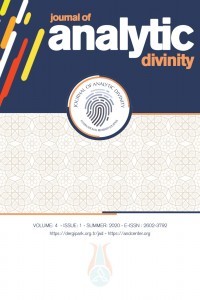Efforts to Similarize Religious Groups During The Ottoman Reformation Age: Example of Tadkîk Al- Muallafat Commission
In Ottomans, the efforts for modernization took place under external pressures trying to Westernize the dynamics of the state and society and internal difficulties presented by the historical adventure of Ottoman State. In particular, disposition of the Janizary-Bektashi spiral did not only led to significant changes and transformations in military terms, but also in religious and cultural aspects too. Rather than the insight traditions with a wide ontological and epistemological area with no borders, the state has preferred the Sunni/academic Islam which was in a more preferable condition in terms of legitimizing the secular pressures of reformation and the society was tried to be made religiously and culturally similar around it. This was done with policies limiting the faiths and minds of certain groups, trying to pull them towards academic Islam, rather than disposing those groups. These policies, also projecting to homogenise ulama and meshayeh, madrasa and monastery, started to take shape with Mahmood II, and continued in the following periods with variations. This report is about the activities of Tadkîk al-Muallafat Commission, one of the most obvious indicators of that period and established under the roof of Bâb al-Mashîhat.
Anahtar Kelimeler:
Ottomans, Sect, Sheikdom, Tadkîk al-Muallafat Commission
Osmanlı Reform Çağında Dinî Zümreleri Aynılaştırma Çabaları: Tedkîk-İ Müellefat Encümeni Örneği
Osmanlı modernleşme çabaları bir taraftan devlet ve toplum dinamiklerini Batı ile aynılaştırmayı amaçlayan harici baskılar diğer taraftan da Osmanlı Devleti’nin kendi tarihi serüvenin dayattığı dâhili zorunluluklar eşliğinde gerçekleşmiştir. Özellikle Yeniçeri-Bektaşi sarmalının tasfiyesi, askeri açıdan olduğu kadar dini ve kültürel açılardan da ciddi değişim ve dönüşümlere yol açmıştır. Devlet, sınırları belli olmayan geniş bir ontolojik ve epistemolojik alana sahip olan irfan gelenekleri yerine tarihi birliktelik tecrübesinin de etkisiyle reformun seküler baskılarını meşrulaştırma hususunda Sünni/kitabi İslam’ı tercih etmiştir. Başka bir deyişle Toplum, İslam’ın bu yorumu etrafında dinî ve kültürel olarak aynılaştırılmak istenmiştir. Bu durum söz konusu çevrelerin tasfiyesinden ziyade onların inanç ve zihin dünyalarını sınırlandıracak, kitabi İslam dairesine çekilmelerini sağlayacak politikalar eşliğinde yapılmaya çalışılmıştır. Ulema ile meşayihin, medrese ile tekkenin homojenleştirilmesini de öngören bu politikalar II. Mahmut döneminden itibaren şekillenmeye başlamış ve sonraki dönemlerde çeşitlendirilerek devam etmiştir. İşte bu makale söz konusu sürecin en açık göstergelerinden birisi olup Bâb-ı Meşîhat çatısı altında kurulan Tedkîk-i Müellefat Encümeni’n faaliyetlerini konu almıştır.
___
- Sadaret Mektûbî Kâlemi, Mühimme (A. MKT. MHM)
- Sadaret Mektûbî Kâlemi, Meclis-i Vâlâ (A. MKT. MVL)
- Bâbıâlî Evrak Odası (BEO)
- Maarif (C. MF)
- Hatt-ı Hümâyûn Tasnifi (HAT)
- Dâhiliye Nezareti Mektubi Kalemi (DH. MKT
- Dâhiliye Siyasî Evrak (DH. SYS)
- İbnülemin Tasnifi (İ. EV)
- Maarif Nezareti Mektûbî Kâlemi (MF. MKT)
- Yıldız Sadaret Hususi Maruzat Evrakı (Y. A. HUS)
- Mütenevvî Maruzât Evrakı (Y. MTV)
- BOA (1999). MD. 7 (975-976 / 1567–1569), (Prepared Hacı Osman Yıldırım, Muhammed Safi Vahdettin Atik , Dr. Murat Cebecioğlu , Mustafa Serin , Osman Uslu ,
- Numan Yekeler), Publication number 37, Divân-ı Hümayûn Sicilleri Dizisi V, Ankara: BOA
- Meşihat Arşivi Tedkîk-i Müellefat Müzekkire ve Tedkîk-i Mesâhif-i Şerîfe Kayıt Defteri, Number 1784. (Briefly in the text: MA. TMM).
- ARSLAN, Ihsan (2012), "The first Turkish Reign and Sovereignty of the Islamic State Symbols" EKEV Academy Magazine, 16/51, 73-92.
- BARBIER, Maurice (1999). Religion and Politics in Modern Western Thought, (Translation Özkan Gözel), Istanbul: Kaknüs Publications.
- ES'AD EFENDİ (2005). Üss-i Zafer, (Prepared Mehmet Arslan) Istanbul: Book house Publications.
- GENCER, Bedri (2012). Islamic Modernism, Ankara: Eastern Western Publications.
- IŞIK, Zekeriya (2017). Sheikhs and Shahs Development and Change Processes of State-Sutra Relations in Ottoman Society, 2nd Edition, Konya: Çizgi Bookstore.
- IMBER, Colin (2004). Ebussuud from Sharia law and Islamic law in the Ottoman Empire, Istanbul: History Foundation Dorm Publications.
- LUCKMANN, Thomas (2003). Invisible Problem of Religion in modern society, (Translated by Ali Coskun and Fuat Aydın), Istanbul: Ragbet Publications.
- Okumuş, Ejder(2009). "Social Change and Religion", Electronic Journal of Social Sciences, www.esosder.org Electronic Journal of Social Sciences info@esosder.org, Fall-2009 C.8, S.30, 323-347.
- SELÇUK, H. (2011). "XX. The Perspective of the Ottoman State to the Alevi Society in the Century (Army Example) ", Turkish Culture and Hacı Bektaş Veli Research Journal, p. 59, 71-90.
- S. TURNER, Bryan (1997). Max Weber and Islam, (Translated by Yasin Aktay), Ankara: Vadi Publications.
- ÖZER, Ekrem (2007). Lodge and Sect Reforms in the Ottoman Empire II.Mahmut Period and its After-, AUSB, Doctoral Thesis, Erzurum.
- VAROL, Muharrem (2001). Sectical Politics of the Ottoman State after the Interest of Bektashism (1826-1866), MUTA, Doctoral Thesis, Istanbul.
- Yayın Aralığı: Yılda 2 Sayı
- Başlangıç: 2017
- Yayıncı: Özcan GÜNGÖR
Sayıdaki Diğer Makaleler
Alevî–Bektaşî Velâyetnâmelerinde “Ejderha” Motifi
Dini Grupların Dini Bilgi Kaynaklarını Kullanırken Araçsallaştırdığı Formlar (FETÖ Örneği)
Safvetü’l- Beyân fî Tefsîri’l- Kur’ân’ın Kaynak, Özellik ve Muhteva Bakımından İncelenmesi
Nusayrîlerin Kültürel Etkileşim İncelemeleri
Molla Sadra'nın Epistemolojsinin Ontoloji ve Mantıkla İlişkisi
Sosyolojik Bağlamda Yusuf Akçura Düşüncesi ve Din
Sosyoloji ve İlahiyat(çı) Açısından Anlamı
Özcan GÜNGÖR, Mehmet Emin SARIKAYA
Molla Sadra'nın Epistemolojsinin Ontoloji ve Mantıkla İlişkisi
